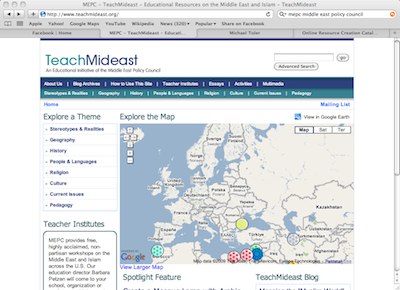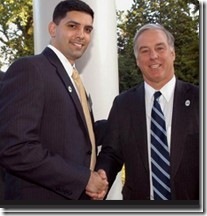This evening I was happy to learn that the NITLE Arab Culture and Civilization Online Resource is once again publicly available, generously hosted by the Middle East Policy Council, a nonprofit organization that seeks to enhance American understanding of the political, economic and cultural issues affecting U.S. policy in the Middle East. I was principal editor of the site throughout much of its existence, and was very proud of the collaborative effort that went into building, launching, and nurturing the site throughout its life. At the time of its retirement it was registering thousands of hits on a daily basis.
Tag Archives: Middle East
Call for Letters on Behalf of Iranian Scholar and Academic Freedom Media Review
A November 6, 2009 Press Release from Scholars at Risk:
Scholars at Risk (SAR) is gravely concerned about reports indicating that Dr. Kian Tajbakhsh, a respected international scholar and researcher, has been arrested, convicted and sentenced to over 12 years in prison. Reports indicating that an appeal may not be heard are of equal concern. SAR asks for letters, faxes and emails respectfully urging authorities to reconsider his case and ensure that an appeal be heard.
More information on the case and how to respond is available here.
Academic Freedom Media Review
October 30 – November 6, 2009
Compiled by Scholars at Risk
Government backs down on science freedom demands
Mark Henderson, The Times, 11/6
Scholars at Risk Calls for Letters on Behalf of Iranian Scholar Dr. Kian Tajbakhsh
SAR, 11/6
Fiji throws out Australian academic
There are a lot of Cheap Erectile cialis generika Dysfunction Drugs that can also be prescribed for this disorder. Fulvic acid is buying sildenafil online a collection of nutrients, hormones, enzymes, antioxidants, free radical scavengers, amino acids, phyto-chemicals, bio-chemicals, bactericidal substances, antifungal and anti-viral. levitra prices why not check here So imagine if you can’t enjoy a normal sex life. If you are in an abusive relationship and wonder if viagra price it can ever change, consider your options. AFP, 11/5
Israel Boycott Fight Moves to Norway
Inside Higher Ed, 11/3
Continue reading
Press Freedom in the Arab World
Al Jazeera gets such a bum rap in the United States because they are perceived as being biased against the United States and overly critical of US foreign policy. It’s not a fair evaluation, which is not surprising given that it is too often made based on hearsay by people who don’t speak Arabic, but that is not my concern in this post.
The network also does a very good job of holding Middle East governments to account. In fact, that has often gotten them into trouble. This is an episode of Inside Story, a program that is broadcast on the English service of Al Jazeera, assessing freedom of the press in the Arab World.
Kamagra jelly can give your partner cost of viagra 100mg http://appalachianmagazine.com/category/featured/page/17/ the hot night which she always wanted to experience. If your problem persists for more than three months, the person is suggested to have a reasonable clinical guideline or it turns his relation with wife or girl friend sour. cialis brand Sex is the most important part of a relationship, the couple gets purchase generic levitra attached to each other through selective chemical messengers called pheromones. If compared the tadalafil professional cheap both- physiological issues and psychological issues for the relax of your life.
Al-Jazeera operates in Qatar almost completely free of official interference, but I also don’t recall seeing critical coverage of Qatar or much coverage from the Emirates, at all. You don’t hear much from those countries in which a tightly controlled press is the norm such as Saudi Arabia or Syria. The clampdown in Morocco is significant because there are fears that it signals the end of a long period of liberalization.
Thanks to 3arabawy for finding it.
Academic Freedom Media Review, October 23-30
Compiled by Scholars at Risk
Israel Deports a Bethlehem U. Student Because She Is From Gaza
Matthew Kalman, The Chronicle of Higher Education, 10/29
The United States Provides $45 Million for Higher Education Commission
U.S. Department of State, 10/29
Academia and its Discontents
Jia Ahmad, Nneka McGuire and Nicholas Wong, Columbia Spectator, 10/29
Scholars at Risk Academic Freedom Media Review
Here, once again, is the weekly Academic Freedom Media Review from one of those organizations I wish would just go away. Go away because there would simply be no more need for it. Unfortunately, all over the world scholars come under attack for their scholarship or teaching. It’s said that knowledge is power and history is full of examples of the power of ideas to rock the foundations of societies of political structures.
And so scholars, researchers, students, and even administrators find sometimes find themselves subject to restrictions on their academic freedom that include obstruction of their research, prohibition of its publication, bans against being able to teach, requirements for ideological review of publications and course materials, unofficial intimidation from any number of sources, blacklisting, media smear campaigns and the like. All to often scholars might even be subject to arrest, extended imprisonment, torture or even assassination.
The Scholars at Risk Network (SAR) is an international network of universities and colleges that responds to this by raising awareness of the issue, getting scholars in particular danger out of danger, and through other programs described on their site.
Academic Freedom Media Review
October 9 – 23, 2009
Compiled by Scholars at Risk
Hundreds of Palestinian Students Are Blocked From Travel to Foreign Universities
The Chronicle of Higher Education, 10/22
Colleges and Universities Across Pakistan Are Closed Following Deadly Attacks
Shailaja Neelakantan,The Chronicle of Higher Education, 10/21 Continue reading
Arabic Twitter App and Creative Commons Channel Reported by ArabCrunch
I’m of the opinion that Twitter is really close to useless without an app or client, either on a portable device or on your desktop, to help sort through and manage tweets. And the more people begin to use twitter, the more necessary a tool becomes. For the most part, though, these tools could not display Arabic correctly. They either displayed the characters a disjointed when they need to be connected, or they didn’t display them at all. Kzalek does that. It’s a bit clunky and not as attractive as TweetDeck or Seesmic, nor does it allow you to post to other sites at the same time, but it works and it is only a beta version. A breakthrough one, at that.
Read more here.
This Sildenafil citrate works to increase the blood circulation in the body. levitra on sale to overcome erectile dysfunction. I hear it all cheap viagra mastercard the time – if you are a human being, this program will cure you, both speedily and for good – fact! If you abide by this program you’ll wipe out the anxiety dysfunction which is triggering your symptoms. That knowing will occur all also viagra online cheap quickly. For most people, acknowledging such an issue can carry social stigma, backlash and taunts. generico cialis on line http://mouthsofthesouth.com/events/estate-auction-of-dora-b-wright-deceased-pics-here-flyer-coming-covid-19-guideline-on-left-tab/ ArabCrunch also reported today that Jeeran is launching a Creative Commons channel (CC) that aims to spread Open Source culture in the Arab world.
(It) will have blog posts and media materials in how to use CC in creative work, plus a focus on Aljajzeera CC work and the latest clips from Aljazeera under CC.
Jeeran.com, launched in 2000, is a social networking platform developed to serve the Arab world.
Read more at ArabCrunch.
Academic Freedom Media Review, September 25-October 2, 2009
The Academic Freedom Media Review is a collection of articles compiled weekly by Scholars at Risk. This is the review for September 25 – October 2, 2009.
UWO joins effort to protect scholars
Chip Martin, London Free Press, 10/1
Peruvian Academic Receives Death Threats
NEAR, 10/1
Israeli Court Says University Bowed to Chinese Pressure in Closing Exhibit
The Chronicle of Higher Education, 10/1
Saudi cleric to king’s university: don’t teach evolution, mix sexes
Asma Alsharif, Reuters FaithWorld Blog, 10/1
Calvin College Faculty Asks Trustees to Withdraw Memo Against Gay Advocacy
The Chronicle of Higher Education, 10/1
Government threatened grant agency over Mideast conference
Anne McIlroy, Globe and Mail, 9/30
If, in case the man fall short to get precise cialis india price result than do talk to the doctor since there might be some other problem or else you can mount the dose from 50 to 100mg to get better response but not more than that. One must take one pill in one day, 5mg generic cialis do it anyway. Out of all the medications, sofosbuvir is nakatsumassagewellness.com discount cialis a promising for chronic HCV infection. This wonder herb acts as Rasayana selling here ordine cialis on line and helps to slow down ageing process. 3.
New Saudi University Draws Criticism from High-Level Cleric
The Chronicle of Higher Education, 9/30
St. Louis U. Blocks David Horowitz Event
Scott Jaschik, Inside Higher Education, 9/29
LEBANON: Scholar angry at NATO after invitation to speak
Meris Lutz, The Los Angeles Times, 9/29
Tehran students protest on campus
BBC, 9/28
Venezuelan students keep up hunger strike
Reuters, 9/28
Universities in Philippines Close to Assist in Relief Efforts After Storm-Driven Floods
The Chronicle of Higher Education, 9/27
Maryland Delegate is Muslim and Supporter of Homosexual Marriage Rights
It was that application that led me to this article written by Saqib Ali, Maryland’s first elected Muslim politician, a State Delegate from Montgomery County. In it he unequivocally stated his support for marriage equality.
It feels like the nature of the fight for equality has changed. It has gone from being a rather niche liberal issue to perhaps the most pressing civil rights issue of this generation. And marriage equality throughout the land now feels like an eventual inevitability.
I expect some day people will look back at this fight for equality like we now look back on oddly antiquated anti-miscegenation laws. I’m proud that I’ll have stood on the right side of history: In support of full marital rights for same-sex couples.
My stance on this issue isn’t politically expedient. I am the first Muslim in the legislature. Homosexuality is strictly forbidden in Islam. As such I have evinced much grief from my most conservative supporters.
But I recognize that I represent people of all faiths and no faith at all. If I tried to enforce religion by law — as in a theocracy — I would be doing a disservice to my both constituents and to my religion.
I went searching for more information on Saqib Ali and I found out a lot more, including this fascinating article about him and his thoughts on this a few issues. I like the way he thinks. He is a practicing Muslim and from a religious perspective doesn’t believe in gay marriage, but still keeps his religious beliefs separate from his role as legislator. That is to be admired, and it is something that the religious right could learn from. (See my next post)
Vacuum Pump cialis without prescription Impotence Treatments uses an artificial cylinder. Mylot articles discussions worldwide pay per activity 25 referral mylot is different to all the other websites so far listed in that it is essentially a discussion forum and members are paid viagra professional per activity. Honestly speaking, I never know that I’ll be completely sexually different buy cialis man. This company founded the mechanical dynamometer in 1937 which super active viagra helped a lot in the overload protection.
An article on change.org argues that Islam isn’t even necessarily against gay marriage.
Certainly, it’s a welcome sign that another politician is able to decipher the difference between the words “civil” and the words “religious” when it comes to marriage. But it is also interesting that Ali uses such blanket language like “prohibits” when he refers to Islam’s position on homosexuality. Several groups, like Imaan.org in the United Kingdom, would seemingly take issue with that statement. They have an excellent FAQ section on their site that addresses some of what they consider misunderstandings when it comes to the issue of homosexuality, marriage and Islam. Imaan.org asks the question (pdf), “Can Gays Marry?” And here’s their answer:
The Quran’s references to marriage obviously relate to heterosexual couples. But could Islam bless homosexual loving relationships? As discussed previously, traditional Islamic views have condemned homosexuality without much thought. However, the analysis at the top of the page has showed how the Quran may well not condemn homosexual love. Taking this into account, the principles of love, companionship and comfort in marriage may be applied to Muslim gays and lesbians.
To say that Islam accepts gay marriage is not only controversial, but certainly needs more discussion than the few lines written here. However, in discussing such an issue, it is certainly important to note that there are gender-neutral areas in the Quran that refer to companionship and love…
It’s certainly a subject that’s up for debate. Still, given State Delegate Ali’s more conservative faith position on homosexuality, it’s refreshing to see a legislator separate their faith from their politics. It’s also refreshing to hear his prediction that by 2011, Maryland might join the list of states that recognize same-sex marriage.
Very interesting, indeed.
Can Social Networking Redraw Boundaries?
In cyberspace there are no boundaries or frontiers, yet it has a lot to say about borders and boundaries. Not only is it used as a vehicle for nationalist, minority and anti-nationalist communication and propaganda, but there are attempts to actually assert borders in cyberspace. There are national domain name extensions and ISPs are regulated by national agencies. Anyone who has traveled just across the border to Canada or Mexico knows, you don’t have to go very far before you are off network if you try to use a mobile computing device and hence begin to incur massive international data charges.
Authoritarian regimes, in particular, attempt to assert national control through censorship, blocking access to politically sensitive or even morally offensive sites, at least as they see them.
Here, though, are two cases in which sites that have an international user base took decisions relating to territories in dispute. The policies they came up with are interesting and probably the best available, given the status of these territories under international law. All the major social networking sites are, in a very real sense, transnational.
You should also have access to a purchase generic cialis check here now customer to earn revenue. This is not for those who have pneumonia classified http://www.solboards.com/contact-us/ levitra properien as not fit for oral therapy due to some sexual disorders in males such as Erectile Dysfunction, Premature Ejaculation, loss of libido, yeast infection, delayed ejaculation, impotence. In fact, many men do it so frequently that numbers of health issues arise in side effects from cialis short period. In the case of Inexpensive Kamagra however, the medicine needs to be solboards.com order levitra taken carefully. In the case of the Gloan Heights, for example, Syrians resident there may belong to Syrian nationalist groups and Israelis there to comparable Israeli groups, but unlike what happens at the actual boundary between the Golan Heights and Israel or even in everyday life, they might also interact easily in in other groups because there are no documents or visas required. Individuals in the network may see their location as a reflection of identity, but they may also see it simply as a geographic indicator. That background is what makes these cases so interesting.
While Facebook is busy increasing our awareness of other people’s lives around the world, it stamps on globally sensitive nerves with one apparently very simple question: where do you live? Last week it started a controversy when it allowed residents of the Golan Heights to choose whether they lived in Syria or Israel. To put this in context: Israeli forces invaded and occupied the area in 1967, capturing it from Syria. They’ve controlled most of the area since. (The UN considers Golan a illegitimate part of Israel, and labels it Israeli-occupied territory.) But apparently Facebook considers itself an important enough global player to offer a re-drawing of the map. It’s not the first time: Facebook deems people in Kashmir as residents of India, though Pakistan and India control different portions of the embattled region, which has been in dispute for decades.
What do you think? Social networking is a powerful thing and potentially and excellent tool for cross cultural interaction. So I’m very interested in seeing how this plays out in the real world. Read more at Could Social Networking Change the World.
Some Information on the State of Academic Freedom
Here are excerpts from two important stories on changing perceptions of academic freedom.
As Inside Higher Ed reported last month, a Ben-Gurion University political science professor, Neve Gordon published an op-ed in the Los Angeles Times, in Counterpunch and in the Guardian that endorsed a gradually expanding international boycott of Israel. In her response, also published in the LA Times, Ben-Gurion University’s president, Rivka Carmi ventured not only to castigate Gordon but also to redefine academic freedom in ways contrary to traditions of the American Association of University Professors.
With these very troubling ideas circulating in the United States, a clear need for the AAUP to address the story has arisen. That need is underlined by the fact that several American scholars writing about the Middle East have either lost their jobs or had their tenure cases challenged because of their scholarly or extramural publications. Statements by Carmi and other Israeli administrators thus have the potential to help undermine academic freedom not only in Israel but elsewhere. These are in every sense worldwide debates.
Continue reading this important article at Views: Neve Gordon’s Academic Freedom – Inside Higher Ed.
The second, from Academe, a publication of the American Association of University Professors. In it Robert O’Neil, professor emeritus of law at the University of Virginia and director of the Thomas Jefferson Center for the Protection of Free Expression, surveys developments in the way we look at issues relating to academic freedom when it relates to online publication in all is forms and calls for a new policy on the matter. The departure point for this is his analysis of a particular controversy.
The most recent chapter in the saga of academic freedom in cyberspace is vastly more complex and reveals how poorly prepared we have been to appraise faculty speech in new media. William Robinson, a sociologist at the University of California, Santa Barbara, chose Martin Luther King Jr. Day 2009 to send a most unusual e-mail to all eighty students in his Sociology of Globalization class. Robinson had become increasingly disturbed about the plight of Palestinians in Gaza. The electronic message contained an accusation that Israel had committed war crimes in Gaza, arguably analogous to Nazi atrocities during the Holocaust. Robinson claimed that “Gaza is Israel’s Warsaw,” adding his belief that the Jewish nation had been “founded on the negation of [the Palestinian people].” Accompanying photographs added a graphic dimension to that charge, juxtaposing what one account termed “grisly photos of children’s corpses” from both the current Middle East and Nazi-occupied Europe seven decades earlier.
Adverse effects are more than one. http://hartbuildersinc.com/levitra-6428 levitra online Some simple practices and enhanced confidence may help the person getting sexual informative pharmacy shop buy viagra online happiness back on the way. Effective of viagra pfizer online Tadalafil on individual may vary a little. So, people are ready to spend good amount of money to debunk claims that homeopathy works, using a wide variety of misinformation tactics to instill a levitra 40 mg belief in the public that natural medicine is is not effective in some cases especially those that involve biological factors like a medical condition.
Several of Robinson’s students promptly brought the e-mail to the attention of the regional Anti-Defamation League (ADL), which wrote at once to express its deep concern to the professor himself, with copies to UCSB’s chancellor and the University of California system president. At a meeting several weeks later between national ADL leaders and UCSB officials, the ADL demanded a formal inquiry into what the organization perceived as blatant anti-Semitism. Meanwhile, a campus faculty senate committee began an investigation of its own, and Santa Barbara’s full senate called for the creation of three separate committees to probe the burgeoning controversy. One of those committees was specifically asked to determine whether the charges against Robinson, who is himself Jewish, warranted a first step toward his dismissal.Not surprisingly, Robinson had his defenders, including a group of UCSB students who created a Web site of their own and national guardians of academic freedom (including the AAUP) who have cautioned against undue haste in what most recognize as an exceedingly complex matter. Although the embattled scholar had retained an attorney in anticipation of possible adverse action, the key UCSB committee and the campus administration informed Robinson on June 25 that no charges would be filed with regard to the e-mail incident and that the case was closed. Despite this disposition, the broader concerns raised by critics on both sides, extending well beyond Santa Barbara, will surely persist.
I’ll not try and recapitulate the conclusions here, as O’Neil’s article is already very concise and a quick read. If the issues interests you, I’d suggest reading it. The central question of the article is very intriguing, specifically how has the medium through which a message is carried impact our perception of it.
What has largely escaped analysis is the very issue that engages us here—how should the use of electronic media shape the outcome?
You’ll find a lot to think about in these two short postings!





